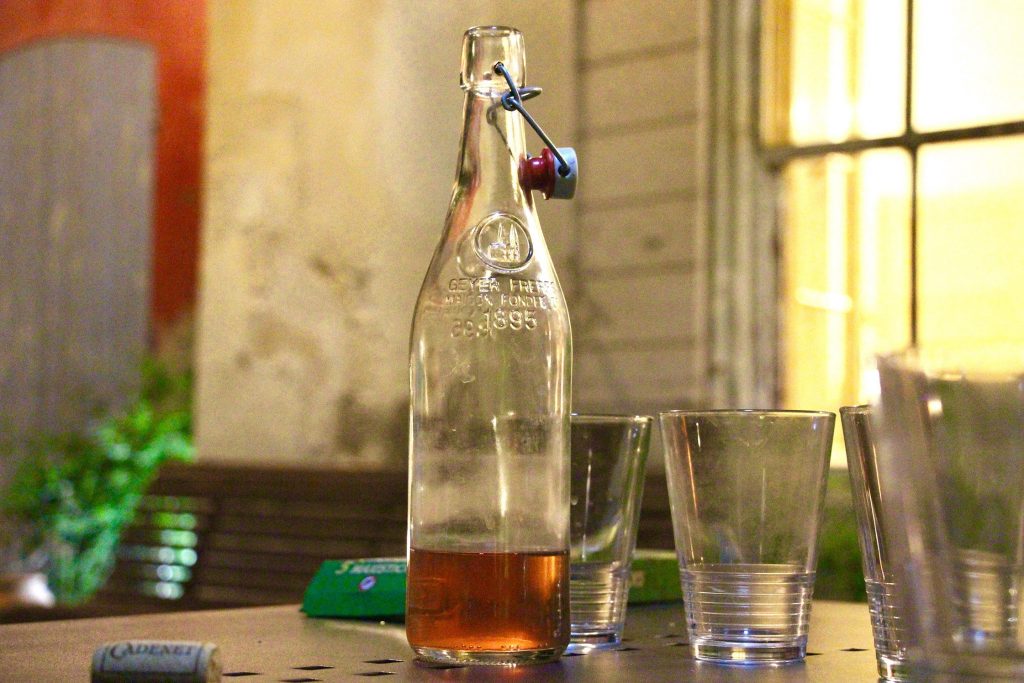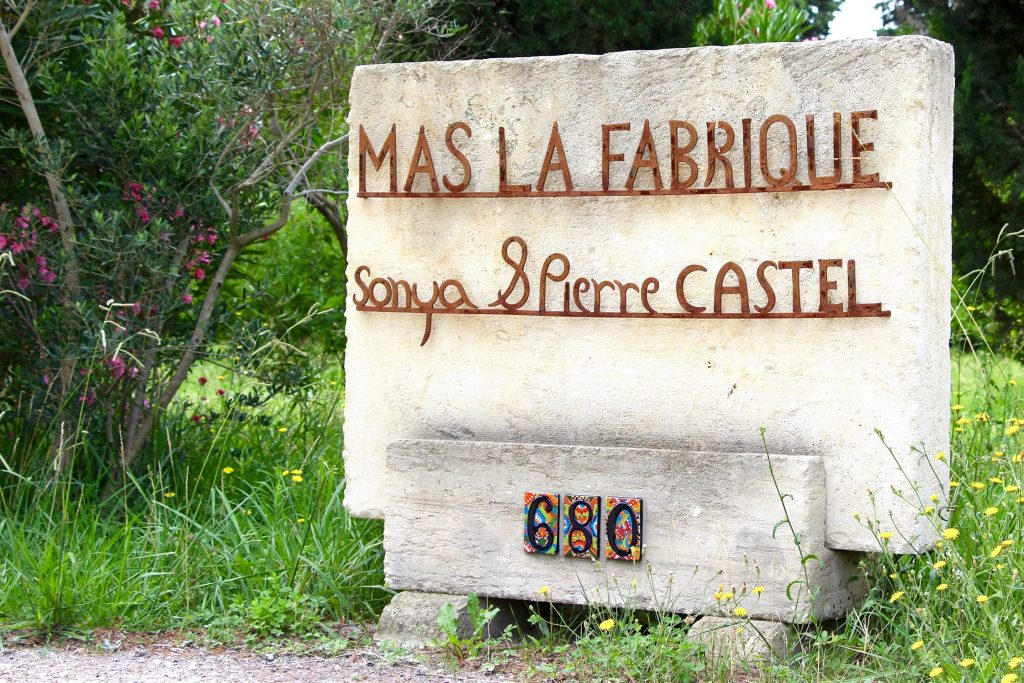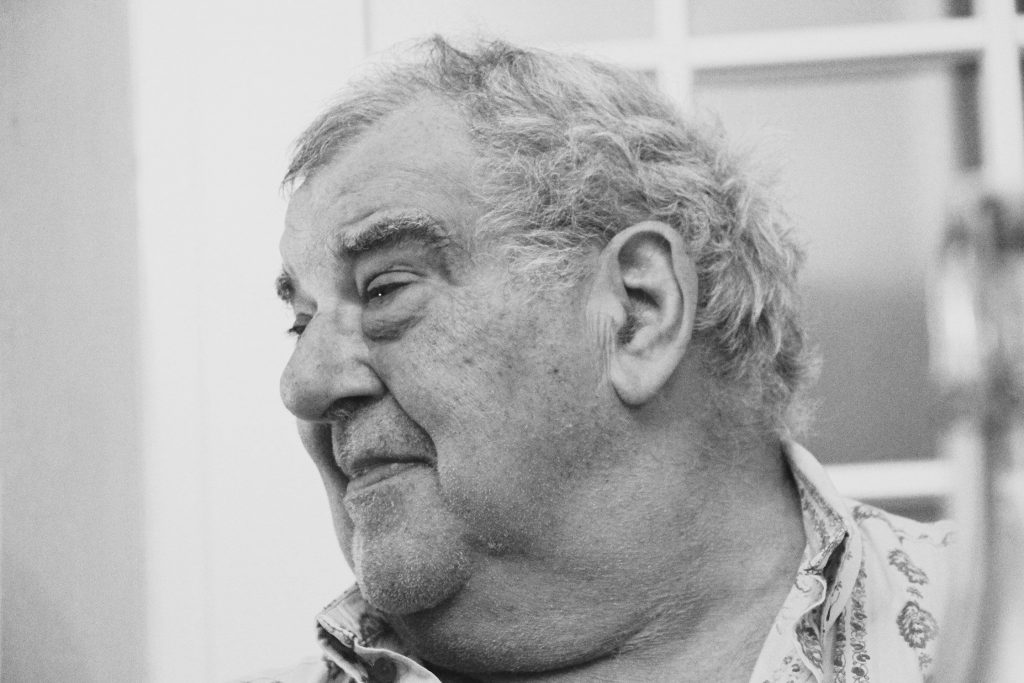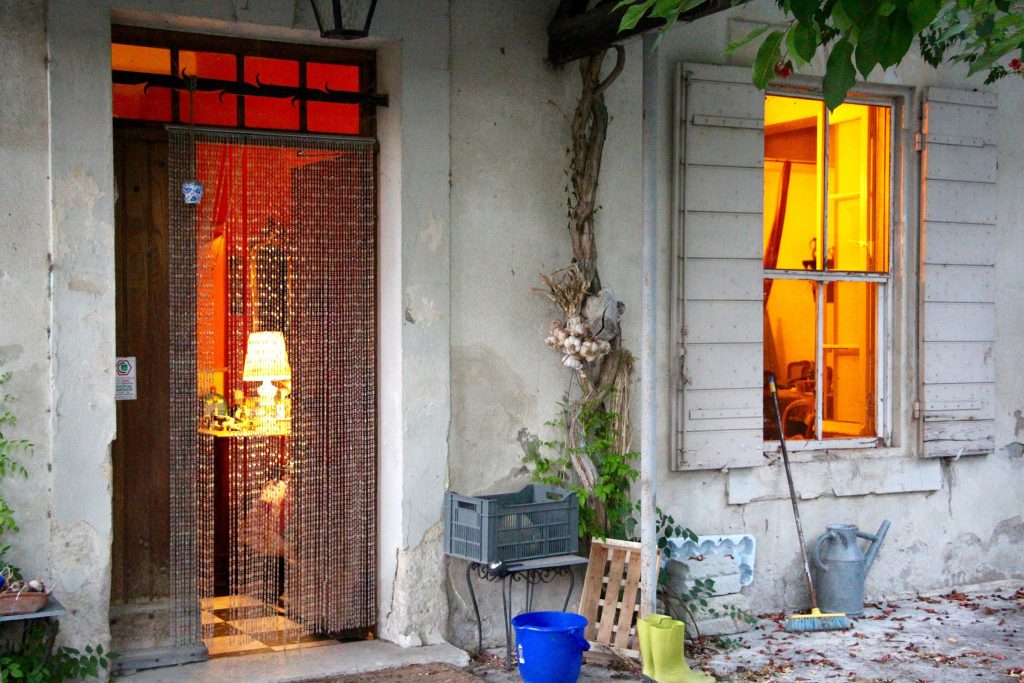
It was time to head south for Provence. We had a hundred and thirty-miles to go to reach the legendary La Fabrique, in Graveson, a place I’d heard Ted talk about for many years, and while it’s normally a two hour drive, it was the Friday before Easter, so we were looking at more like three. We quickly hit Los Angeles level traffic, stuck bumper-to-bumper with the thousands of French Catholics who had taken the day off. So we settled in and Ted took the time to give me a review primer on our destination.
La Fabrique is the home of Sonya Behar and Pierre Castel, and their place is an oasis and way station where Ted can stop for a spell during his long months on the road in Europe. He met them in 2004 when Fabien, his co-worker at The Ojai Vineyard at the time, told him he should stay there the next time he was passing through. Fabien is Pierre’s son (and Sonya’s stepson), and a charming and incredibly friendly man in his own right; every time I see him, we quickly break through small talk and get into discussions about the difficulties in day-to-day existence and how to achieve small victories. In recent years he’s gotten into serious yoga practice to combat (or surrender to) his stressors and now has the warm-eyed glint of those who can see past it all, if even for just some of the time. Ted took Fabien’s advice and spent more than a couple weeks at La Fabrique that year, and has done so every year since.
Ted considers Sonya and Pierre a crucial ingredient in the success of his business. Not only are they inexhaustible hosts who offer housing and the most incredible food to him and whoever he brings along, they also let him have producers ship sample cases to the estate, so he can try wines before he decides to visit a winery. At times, stacks of boxes accumulate in one of their outbuildings before he can get there and start putting a dent in them, which he does with a little help from Sonya and Pierre as well any other friends who might be around.
We pulled in through a big open gate and turned past a sign reading, Mas La Fabrique, in big looping letters. The grounds were covered with a pear, maple and eucalyptus trees hovering over a huge lush green lawn, the ends of which stretched to well out of sight; the foliage was so dense that I couldn’t see the distant edge of the property, which is about 18 acres in total. The landscape was breathtaking, truly some sort of fantasy of what an estate in Provence would look like.

Cars were lined up outside a building to our left that was rented out to a small cluster of families. Beyond that was the main house, a big, ancient edifice with a beige stucco façade beside a newer addition that’s only a couple hundred years old and painted a bright terra-cotta. Pierre would later tell me proudly that the original house was hundreds of years old and made entirely of huge stone blocks.
Two big black dogs charged us as we approached the house, growling and barking with earnest menace. Sonya got up from a big, square outdoor table that could easily seat twelve and shouted, “Jazz! Jongo! Shut up!” The dogs quieted down and circled us, sniffing. It being early evening, the tabletop was already scattered with wine bottles, scotch, Coke and grenadine for mixing, Pernod and pitchers of water (also mainly for mixing).
She gave Ted and Andrea long hugs and lingered with a big gape-toothed smile at Ted like he was a son come home from the war. She shook my hand and remembered to put down the cigarette in her hand only after the greetings were over. Sonya has a wild bush of shoulder length gray hair and a hawkish face made more intense by her sharp gaze, shot through thick, tortoise shell, horn-rimmed glasses like those a SOHO artist might wear. She studied me as she shook my hand, a smile in her eyes that at the same time seemed to be reading me completely.
Ted said hello to Thierry, one of Pierre’s cousins, and his wife Nicole, who I would never see without a cigarette dangling from her lips or fingers in the coming days. She was just finishing one glass of Pernod and was pouring another with a splash of water for her and Sonya. Sonya offered us aperitifs, but we declined, citing a need to settle in and maybe go for a run. Ted and Andrea went over to a new guesthouse near the groves and Sonya led me inside the oldest wing of the compound.
As she showed me through, we passed by dining rooms and salons filled with dark wood antiques, at least one bar or bar cart chock full of spirits, and every corner and surface packed with bric-a-brac. It was a huge house with wings and floors that I would only catch glimpses of but never enter.
I was overwhelmed by a strong smell like nothing I’d ever experienced. It was a mixture of cigarette smoke, alcohol, cooking (that would be incessant in the coming days), perfume, jasmine, sandalwood, coffee and other herbal and spice scents that I just couldn’t put my finger on. She led me up a tiled staircase that turned past walls of three-foot by two-foot blocks of sandstone painted a pale yellow. My room was on the second floor and done in a brighter yellow with accents of emerald green. I thanked her and changed for a much needed jog.
Ted and I ran slowly through the countryside at first, and I followed him down a narrow road between fields of crops with ankle-high plants, too young to reveal their produce and a few greenhouses in neat lines on almost every plot. It was humid, the sun was blazing and I had not run in quite a while (mountain biking being my cardio of choice), so Ted quickly left me in the dust as my every joint began to protest and I slowed to a trot. But it was good enough to work up an appetite, and I thought that maybe if I could keep up some daily exercise it would counteract all the eating we’d been doing. And I had no idea how decadent it was about to get.
Pierre the patriarch had come out by the time we returned, and he sat smoking and drinking whiskey with water as he oversaw his domain. He was dressed in baggy linen pants and a tight white tank top undershirt and was sweating and in the heat. His eyes were puffy but smiling as he smoked and coughed and spoke with a hoarse, rasping voice. During every meal and discussion around the table, he would suddenly burst out in an unexpected, booming laugh, even when nobody else was doing the same. At almost eighty years old, he had a thick scar down the center of his barrel chest from heart surgery a couple years earlier. But here he was, still drinking and smoking up a storm, the epitome of the French Paradox—immortal hedonists, all.

Ted produced a bottle of wine from the prospective client cache and he, Andrea and I finally took our aperitifs in the form of a light, crisp rosé from the Cote Roannaise, a region tucked up into the Massif Central. It was incredibly refreshing on that sultry evening. He then pulled out a long line of samples that we would drink well into the night.
Good Friday dinner was the best thing I’d eaten in I don’t know how long; I quickly came to understand why people drive for hundreds of miles for Sonya’s cooking (in addition to her lovely company). There was a cooked carrot salad with caramelized onions, sesames and cilantro, an egg, salmon and dill tart, similar to a quiche with the flakiest of crusts, and a Turkish dish of white cheese and phyllo dough called breque which everyone joked should be called brick. Though Sonya grew up in Lyon, she and her parents moved over from Turkey when she was a child and this was a longtime favorite of hers from that country. I couldn’t get enough of it, but definitely felt like I was building a schoolhouse in my stomach.
I knew I was done for when Sonya brought out a huge stainless steel mixing bowl brimming with chocolate mousse; she makes it every time Ted comes because she knows it’s his favorite. It was even better than the one we had in Beaune: light and fluffy and somehow much richer than any I’d ever had. Thierry brought out a huge plate of cheeses of different shapes, sizes, colors and rinds. He passed it around and we finished off the meal in the proper French manner.
The bulk of the conversation was in rapid French, since Thierry and Nancy didn’t speak English. Halfway through the meal I met their son Roman, who was in his late twenties and spoke it pretty well. We got to talking about mountain biking; he had done a race on Mont Blanc a year before and said it was a hellish but fun experience. He showed me pictures of his bicycle and legs caked with mud and I told him I would love to do that ride one day. His son and daughter, Mattisse and Leiah, were there as well, both under ten and beautiful. They ate quickly and politely before running off to play with some of the kids who lived in the rental house. Of all the people who I tried my French on, they were the least able to understand me. It didn’t help that I did things like conflate the words horse and hair (cheval and cheveux). At least I kept making them laugh.
Sonya switched easily between the languages and was talking about how yet another riding lawn mower had been stolen from the property. It was strange to me that this place, essentially farmland, could be so prone to crime. But gypsies wandered the area and snuck onto estates at night to abscond with coveted tools that they could then sell a few towns over. At that moment, Jazz and Jango happened to be barking loudly at a guest who had gone to their car for something and returned. I asked if the dogs weren’t good deterrents since they had and would continue to scare the crap out of me every time I approached the house. She said they had tried that with other dogs in the past, but the thieves just gave them meat filled with poison, which killed them. Since then, they have always kept their pets in the house at night.
She started talking about all the great vegetables of the season, especially her favorite, white asparagus, which usually appears between May through early June; we would be eating it at every meal for the next few days. Then she asked me what I would write about the trip and I told her, pretty much everything, including her, the vegetables, thieves and my feeling certain that her dogs wanted to kill me.
She said they once had a writer in residence who used to stay for months at a time. He didn’t pay rent, but was treated as any other guest. I was instantly taken with the fantasy of such a life, an image I had read about in many a novel or seen in movies. Usually the writer gets stuck with writer’s block and languishes in the paradise until he maybe falls into unrequited love with one of the other guests who passes through. Or a love does ensue, but ends in heartbreak. I was probably inventing all this, but I instantly figured one of those scenarios would happen to me.
I said something to Sonya to the effect of taking his place and drifting in a state of ennui, of indulging in the old Baudelarian sense of lingering nothingness in overall existence, clearly colored by my melancholy state of mind during recent months. Since ennui simply means “boredom” in French, she seemed to take issue with the notion that I could possibly live in such a state under her care and hospitality. I tried to explain the literary context of the word as I understood it, and then backpedalled completely, but the damage was done; she shot me a wry smile, blew air through pursed lips, then turned to Ted and Andrea and told them that they eventually gave the writer the boot when small items around the house began to disappear.
Pierre spoke halting English that eventually smoothed out the more he talked to me. He stopped smoking only long enough to eat dinner, then immediately lit up again in the break before the mousse came. Throughout every meal, he refilled his highball glass with his own bottle of cheap rose that he bought in bulk. He let me try it at one point, and admitted as I did so that it was rough stuff but “did the job.” He tapped his ashes into one of the little round steel ashtrays with hinged lids that were clipped to the edges of the table, all the way around, and hacked his throat clear.
He told me about when he was younger and working with essences made for perfumes he had a dream that he was never able to fulfill: he wanted to invent an organ that put off scents when you played the keys. “Scents are a beautiful thing,” he said. Then he pointed at his bulbous red nose. “But they are gone to me; I can’t smell a thing anymore.”
He went on to say that at one point he was working on an essence of violets that they were putting into Beaujolais. I looked over at Ted, incredulous, but he was busy with another conversation. I turned back to Pierre and said, “no way,” to which he responded, “you are young.” He put a finger on his bottom eyelid and pulled down, the old gesture that means, “open your eyes.” I told the story to Ted days later and he reflexively laughed, then stopped dead and said, “really?” His wheels seemed to start turning and I thought maybe he was silently questioning the wine practices of decades past.

While everyone else showed no signs of stopping, it was nearly midnight when I helped clear the table and excused myself. In my bright yellow room, I quickly did the opposite of Pierre’s advice, closed my eyes and fell into a deep and welcome food coma.
Next: Some Downtime Wandering


